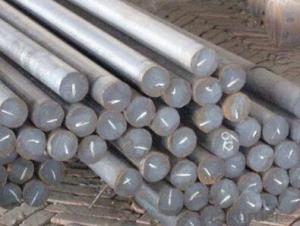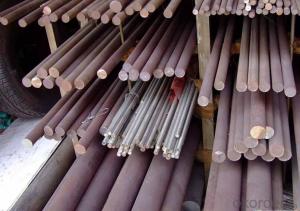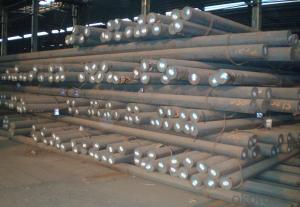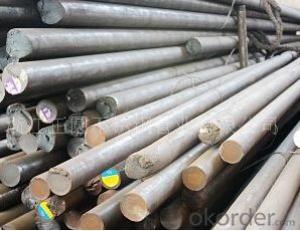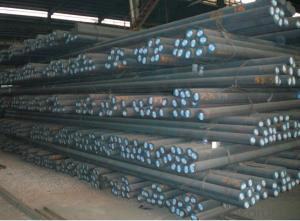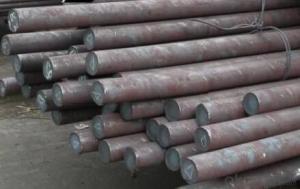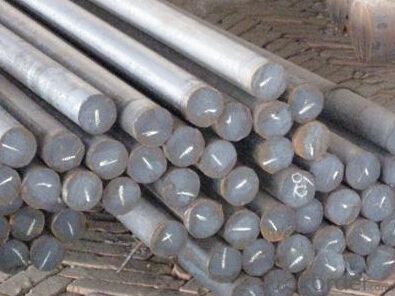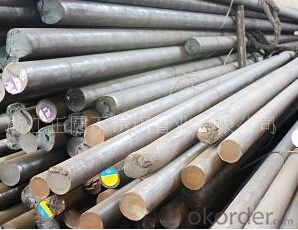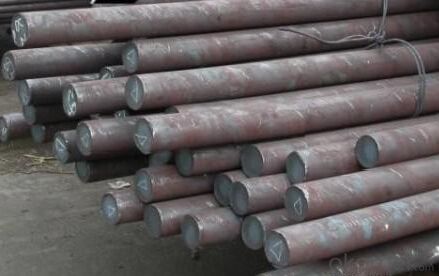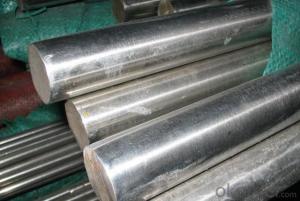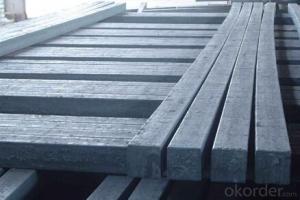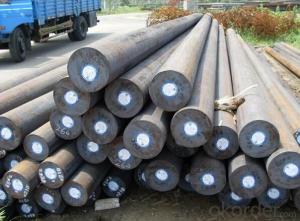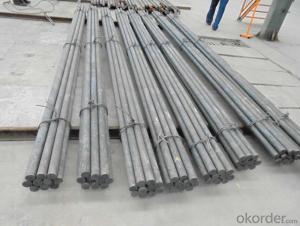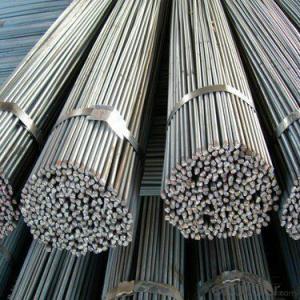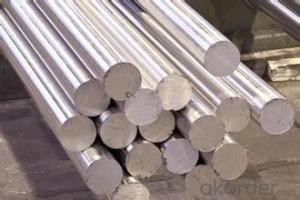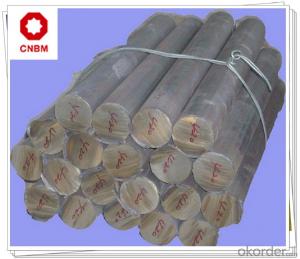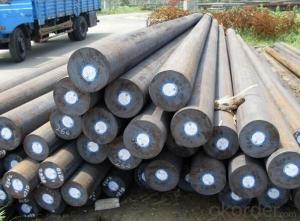Grade Q235B Round Bars-Carbon Round Bar -Alloy Round Bar
- Loading Port:
- Shanghai
- Payment Terms:
- TT OR LC
- Min Order Qty:
- 3 m.t.
- Supply Capability:
- 100000 m.t./month
OKorder Service Pledge
OKorder Financial Service
You Might Also Like
Specification
Grade Q235B Round Bars-Carbon Round Bar -Alloy Round Bar
Details Information of Grade Q235B Round Bars-Carbon Round Bar -Alloy Round Bar
| Name | SAE1045 Carbon Steel Round Bar |
| Shape | Round Bar/Square Bar/Flat Bar/Plate/Wire |
| Standard | GB/ASTM/SAE/AISI/DIN/JIS/EN/BS |
| Surface Treatment: | Black/Peeling/Polished/Machined |
| Delivery Condition: | Hot Rolled or Forged/Peeled or Black Surface |
| Test | SGS/UT 100% Elements Testing |
| Certificate: | ISO/Mill Certificate |
| Service: | 24 hours online service / |
| more than 20 years trading and manufacture | |
| Quality Assurance: | the third party inspection, such as SGS, BV, TUV…etc. is acceptable |
| Packaging Details: | Seaworthy Packaging or as per customer's packing instruction |
| Carbon structure round bar | Q195 Q235A Q235B 10# 20#-55# S45CB |
| Low alloy high strength round bar | Q345A/Q345C/Q345D Q345B Q345E |
| Alloy structure round bar | SAE51B20 20Cr 40Cr 40CrV 20CrMo/30CrMo/35CrMo/42CrMo 20CrMoA/30CrMoA/35CrMoA/42CrMoA/42Cr ML20CrMo/ML30CrMo/ML35CrMo/ML42CrMo B7/SCM435-440 20MnTiB 20CrMnMo 20CrMoH 42CrMoH 40MnB/40MnBH 30Mn2-40Mn2 27SiMn 50CrVA 30CrMnTi |
| Pinion steel | 20CrMnTi 20CrMnTiH 20CrMnTiHCS/20CrMnTiHLD Q20CrMnTi-1/Q20CrMnTi-2 |
| Sucker rod | 20-35CrMoA |
| Free-cutting steel | GT1215S |
| Spring steel | 60Si2MnA 65Mn |
| Ball bearing steel | GCr15 |
Chemical Composition of Grade Q235B Round Bars-Carbon Round Bar -Alloy Round Bar
| C | Si | Mn | P | S | Cr | Ni | Cu |
| 0.17-0.24 | 0.17-0.37 | 0.35-0.65 | ≤0.035 | ≤0.035 | ≤0.25 | ≤0.25 | ≤0.25 |
| Tensile strength (σb/MPa) | Yield strength (σb/MPa) | Elongation (δ5/%) |
| ≥410(42) | ≥245(25) | ≥25 |
Company Introduction of Grade Q235B Round Bars-Carbon Round Bar -Alloy Round Bar
CNBM International Corporation is the most import and export platform of CNBM group(China National Building Material Group Corporation) ,which is a state-owned enterprise, ranked in 270th of Fortune Global 500 in 2015.
With its advantages, CNBM International are mainly concentrate on Cement, Glass, Iron and Steel, Ceramics industries and devotes herself for supplying high quality series of refractories as well as technical consultancies and logistics solution.
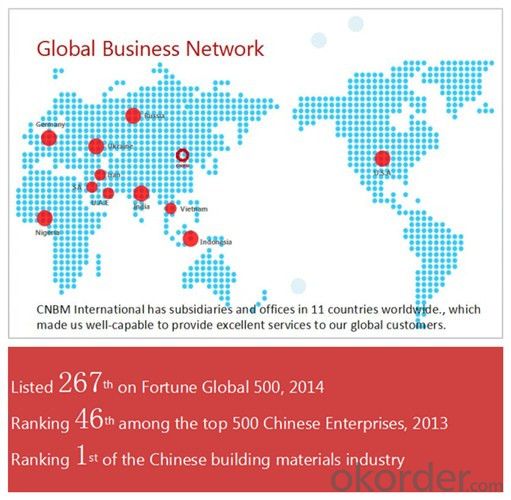
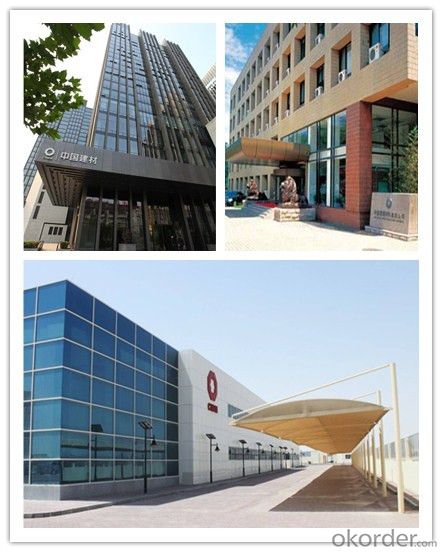
Certificates of Grade Q235B Round Bars-Carbon Round Bar -Alloy Round Bar
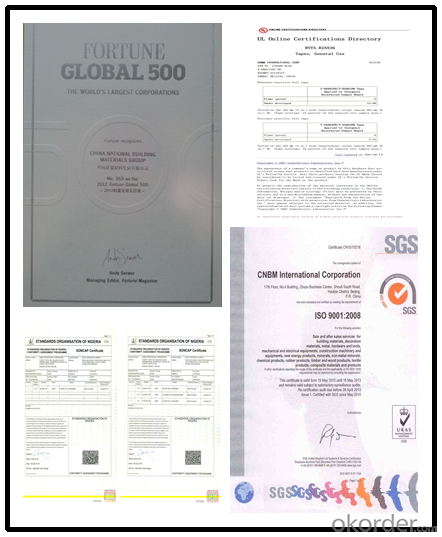
Packaging & Delivery of Grade Q235B Round Bars-Carbon Round Bar -Alloy Round Bar
Packaging Detail | Sea worthy packing /as per customer's packing instruction |
Delivery Detail | 15 ~ 40 days after receiving the deposit |
Products show of Grade Q235B Round Bars-Carbon Round Bar -Alloy Round Bar
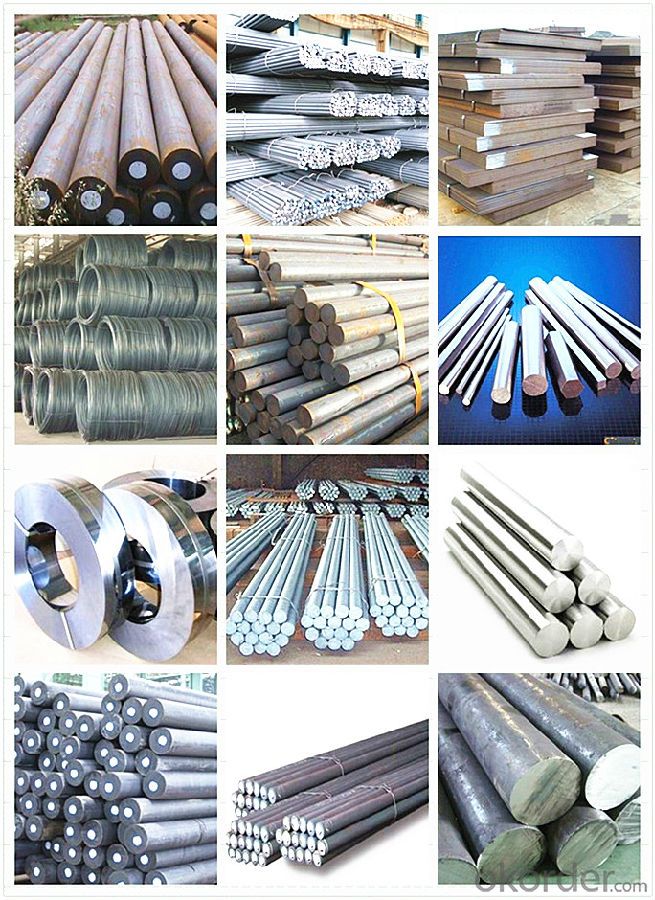
FAQ
Are you a trading company or manufacturer? | Manufacturer |
What’s the MOQ? | 3 metric ton |
What’s your delivery time? | 15-35 days after downpayment received |
Do you Accept OEM service? | Yes |
what’s your delivery terms? | FOB/CFR/CIF |
What's the Payment Terms? | 30% as deposit,70% before shipment by T/T |
Western Union acceptable for small amount. | |
L/C acceptable for large amount. | |
Scrow ,Paybal,Alipay are also ok | |
Why choose us? | Chose happens because of quality, then price, We can give you both. Additionally, we can also offer professional products inquiry, products knowledge train (for agents), smooth goods delivery, excellent customer solution proposals. |
What's your available port of Shipment? | Main Port, China |
What’s your featured services? | Our service formula: good quality+ good price+ good service=customer's trust
|
Where are your Market? | Covering more than 160 countries in the world |
- Q: What are the typical mechanical properties of special steel?
- The typical mechanical properties of special steel may vary depending on the specific grade and composition of the steel, but there are some general characteristics that can be expected. Special steels are often designed to have enhanced properties compared to standard carbon steels, making them suitable for specific applications that require superior strength, hardness, or resistance to wear and corrosion. One of the key mechanical properties of special steel is its high tensile strength. Special steels are typically engineered to have higher strength levels than standard steels, enabling them to withstand heavy loads and stresses without deformation or failure. This makes them ideal for use in industries such as construction, automotive, and aerospace, where structural integrity is crucial. Special steels also exhibit excellent hardness, which is a measure of a material's resistance to permanent indentation or scratching. This property is often achieved through alloying elements and heat treatment processes that increase the steel's ability to resist wear and abrasion. Consequently, special steels are commonly used in tools, cutting equipment, and machinery components that are subjected to severe wear conditions. Moreover, special steel alloys can possess exceptional toughness, which refers to the material's ability to absorb energy and resist fracture under impact or sudden loading. This is particularly important in applications where impact resistance is vital, such as in the manufacturing of heavy-duty machinery or structures subjected to dynamic loads. In addition to strength, hardness, and toughness, special steels may also exhibit improved corrosion resistance compared to standard steels. This is achieved by incorporating alloying elements such as chromium, nickel, or molybdenum, which create a protective oxide layer on the surface of the steel, preventing or slowing down the process of corrosion. This property is highly desirable in industries that deal with corrosive environments, such as marine, oil and gas, and chemical processing. In summary, the typical mechanical properties of special steel include high tensile strength, excellent hardness, exceptional toughness, and improved corrosion resistance. These properties enable special steels to excel in various applications where superior performance is required, making them essential in numerous industries around the world.
- Q: What are the main advantages of using special steel in the construction industry?
- The main advantages of using special steel in the construction industry are its high strength and durability, which allows for the construction of structures that can withstand heavy loads and harsh environmental conditions. Special steel also offers excellent resistance to corrosion, making it suitable for use in coastal or industrial areas. Additionally, special steel is highly versatile and can be easily fabricated and shaped, providing flexibility in design and construction.
- Q: What is the chemical composition of special steel?
- Special steel is a broad term that encompasses a variety of steel alloys with specific properties and characteristics. The chemical composition of special steel can vary depending on the specific grade or type of steel being referred to. However, in general, special steel often contains higher amounts of alloying elements compared to regular carbon steel. These alloying elements can include elements such as chromium, nickel, molybdenum, vanadium, tungsten, and others. The specific combination and proportion of these alloying elements determine the unique properties of special steel, such as increased strength, enhanced corrosion resistance, improved heat resistance, or better wear resistance. For example, some common types of special steel include stainless steel, which typically contains high amounts of chromium and nickel, providing excellent corrosion resistance; tool steel, which has high carbon content and often contains other elements like vanadium or tungsten, making it suitable for cutting, drilling, or shaping tools; and high-speed steel, which contains elements like molybdenum, cobalt, or tungsten, giving it exceptional hardness and heat resistance for use in cutting tools or drills. In summary, the chemical composition of special steel varies depending on the specific type or grade, but it generally includes higher amounts of alloying elements to achieve desired properties such as strength, corrosion resistance, heat resistance, or wear resistance.
- Q: What are the different coating techniques used for special steel?
- There are several different coating techniques used for special steel, including hot-dip galvanizing, electroplating, powder coating, and thermal spraying. Each technique has its own advantages and applications, providing enhanced protection against corrosion, improved aesthetics, or increased durability depending on the specific requirements of the steel.
- Q: What are the properties of corrosion-resistant alloy steel?
- Corrosion-resistant alloy steel possesses properties such as high resistance to rust, corrosion, and oxidation, making it suitable for applications in environments exposed to moisture, chemicals, or extreme temperatures. It typically contains elements like chromium, nickel, and molybdenum, which enhance its resistance to corrosion. Additionally, this type of steel is known for its durability, strength, and ability to maintain its integrity in challenging conditions.
- Q: How does copper influence the characteristics of special steel?
- Copper has a significant influence on the characteristics of special steel due to its unique properties and its role as an alloying element. When added to steel in small amounts, copper can enhance its strength, hardness, and resistance to corrosion. One of the key benefits of copper in special steel is its ability to improve the steel's mechanical properties. Copper increases the strength and hardness of steel, making it more suitable for applications that require high tensile strength and durability. This is particularly important in industries such as construction, automotive, and aerospace, where strong and durable steel is essential. Furthermore, copper also enhances the steel's resistance to corrosion. It forms a protective oxide layer on the surface of the steel, preventing the formation of rust and other forms of corrosion. This makes copper-infused steel ideal for use in harsh environments or applications where exposure to moisture or corrosive substances is common. Additionally, copper can improve the machinability of special steel. It acts as a lubricant during the machining process, reducing friction and heat generation. This results in improved tool life, reduced energy consumption, and enhanced productivity. In summary, the addition of copper to special steel can significantly influence its characteristics. It enhances the steel's strength, hardness, and corrosion resistance, making it more suitable for demanding applications. Moreover, copper also improves the machinability of steel, leading to increased productivity and cost-effectiveness.
- Q: How is special steel used in the medical supply chain?
- Special steel is used in the medical supply chain for a variety of applications. It is utilized in the manufacturing of surgical instruments, implantable devices, and medical equipment due to its high strength, corrosion resistance, and biocompatibility. Special steel ensures the durability and reliability of these critical medical supplies, contributing to the safety and effectiveness of healthcare procedures and treatments.
- Q: What are the different methods of surface coating for special steel?
- For special steel, there exists a variety of surface coating methods that can be utilized based on the desired outcome and application. Some of the most frequently employed techniques are as follows: 1. Electroplating: By employing an electric current, a thin layer of metal can be deposited onto the surface of the steel. This process enhances the steel's corrosion resistance, wear resistance, and overall aesthetic appearance. 2. Hot-dip galvanizing: This method entails immersing the steel in molten zinc, resulting in the formation of a protective coating on the surface. Hot-dip galvanizing offers exceptional corrosion protection and can be utilized for both interior and exterior applications. 3. Powder coating: This technique involves the application of a dry powder onto the steel's surface, followed by heating and curing to create a durable and visually appealing coating. Powder coating provides excellent corrosion resistance, impact resistance, and allows for customization of colors. 4. Physical vapor deposition (PVD): PVD is a vacuum coating process where thin layers of metal are deposited onto the steel's surface. This method enhances the steel's hardness, wear resistance, and chemical resistance. It is commonly employed for decorative finishes and to improve the performance of cutting tools. 5. Chemical conversion coating: This method entails treating the steel surface with a chemical solution, which reacts with the surface to form a protective coating. Chemical conversion coatings provide corrosion resistance and can serve as a base for painting or other coatings. 6. Thermal spraying: Thermal spraying involves melting or heating a coating material and projecting it onto the steel surface using a spray gun. This technique can be utilized to apply a wide range of coatings, including metals, ceramics, and polymers. Thermal spraying improves the steel's wear resistance, corrosion resistance, and thermal insulation properties. These examples merely scratch the surface of the available surface coating methods for special steel. The choice of method relies on factors such as desired properties, application requirements, and budget. Consulting with experts in the field is crucial to determine the most suitable coating method for specific steel applications.
- Q: What are the challenges in working with special steel?
- When it comes to working with special steel, there are several distinct challenges that set it apart from regular steel. Let's take a look at some of the main difficulties one might encounter in this field: 1. Expensive nature: Special steels often come with higher production costs due to their unique composition and properties. The raw materials used in their production may be scarce or require intricate manufacturing processes, resulting in increased expenses. 2. Limited availability: Special steels are not as readily accessible as regular steels, making it more arduous to source them. This limited availability can lead to longer lead times and potentially higher costs when attempting to obtain the necessary materials. 3. Machining complexity: Special steels can prove challenging to machine due to their elevated hardness or toughness. Their distinctive properties may cause excessive tool wear, resulting in increased machining time and costs. Overcoming these challenges may necessitate the use of specialized cutting tools and machining techniques. 4. Heat treatment requirements: Achieving the desired mechanical properties of special steels often demands precise and specific heat treatment processes. The complexity of heat treatment lies in the careful control of temperature, time, and cooling rates. Improper heat treatment can result in inconsistent material properties or even material failure. 5. Welding difficulties: In comparison to regular steels, certain special steels may exhibit poor weldability. They may be prone to cracking or require preheating and post-weld heat treatment to ensure proper joint integrity. This can introduce complexity and cost to welding processes. 6. Corrosion susceptibility: While special steels may possess excellent mechanical properties, they can sometimes be more vulnerable to corrosion when compared to regular steels. This necessitates additional measures to protect the steel from corrosion, such as applying protective coatings or utilizing corrosion-resistant alloys. 7. Knowledge and expertise requirements: Working with special steels typically demands a higher level of technical knowledge and expertise. The unique properties and characteristics of these materials necessitate a deep understanding of their behavior and effective handling. This may call for specialized training or collaboration with experts in the field. Despite these challenges, working with special steel also offers various benefits, including superior strength, durability, and performance in specific applications. By comprehending and addressing these challenges, engineers and manufacturers can leverage the unique properties of special steel to develop innovative and high-quality products.
- Q: How does special steel contribute to the railway industry?
- Special steel contributes to the railway industry by providing high-strength, durable and corrosion-resistant materials for various components such as rails, wheels, and axles. This ensures the safety and reliability of train operations, as special steel can withstand heavy loads, extreme temperatures, and intense wear and tear. It also enables the construction of lighter and more efficient trains, improving fuel efficiency and reducing maintenance costs. Additionally, special steel is essential for the development of advanced technologies like high-speed trains and magnetic levitation systems, pushing the boundaries of railway transportation.
Send your message to us
Grade Q235B Round Bars-Carbon Round Bar -Alloy Round Bar
- Loading Port:
- Shanghai
- Payment Terms:
- TT OR LC
- Min Order Qty:
- 3 m.t.
- Supply Capability:
- 100000 m.t./month
OKorder Service Pledge
OKorder Financial Service
Similar products
Hot products
Hot Searches
Related keywords
